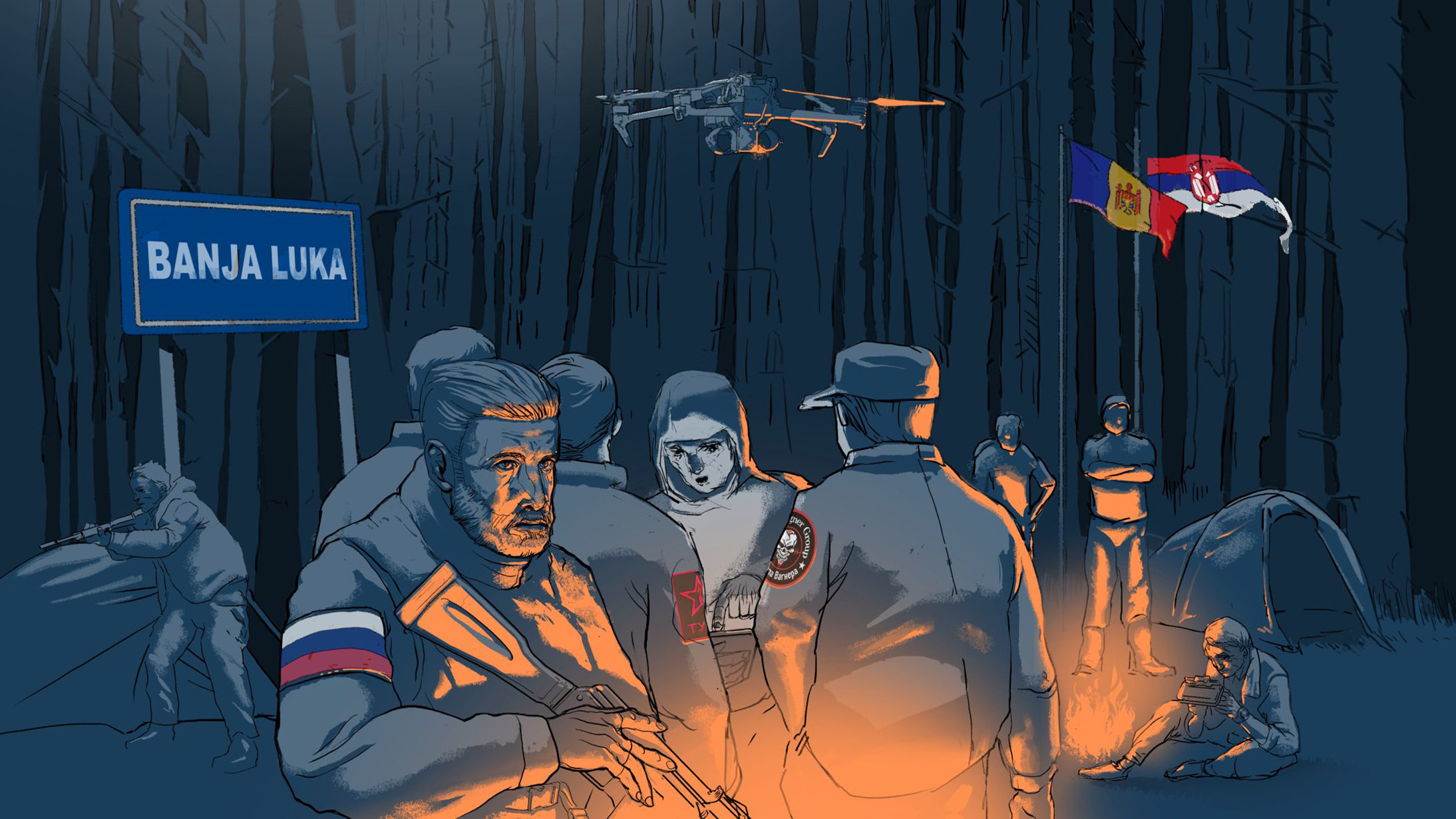Shortly before the first round of Moldova’s presidential election and the constitutional referendum on EU accession, Moldovan law enforcement thwarted an attempt to massively destabilize the country. After conducting nearly 90 raids at various locations nationwide, they seized 1.6 million lei and identified over a hundred individuals who had been trained to organize mass unrest. Some of them received training in structures linked to the “Wagner” and “Farm” private military companies. The training took place in Russia, as well as in paramilitary camps in Bosnia and Herzegovina and Serbia.
The Prosecutor’s Office for Combating Organized Crime and Special Cases (PCCOCS) of the Republic of Moldova later noted that the purpose of training Moldovan citizens in the Balkans was to organize mass protests aimed at preventing Moldova’s rapprochement with the European Union. The “agents of chaos” were to spring into action if the pro-European presidential candidate won and the constitutional referendum yielded a positive result. Given that although a slim majority supported the constitutional amendments, and the incumbent pro-European president Maia Sandu won the election, the destabilization scenario was set to commence immediately after the referendum results were announced. However, this outcome was prevented.
The investigation into attempts to destabilize Moldova following last year’s elections is ongoing. Recently, thanks to the work of an international team of investigative journalists, new details of the sensational case have emerged.
Training program for saboteurs
The first information regarding Moldovan law enforcement’s actions to counter plans to destabilize the country was provided three days before voting day, on October 17, 2024. A press briefing was held by the Director of the Security and Intelligence Service of Moldova (SIS), Alexandru Musteața, the head of the National Police, Viorel Cernăuțeanu, and the Acting Chief Prosecutor of the PCCOCS, Victor Furtună.
After the briefing, the SIS provided additional information.
According to the SIS, over several months the agency was collecting information on attempts to destabilize the constitutional order in the context of Moldova’s electoral processes. It was established that the pro-Russian oligarch Ilan Shor, currently hiding from Moldovan justice, used the public organization “Eurasia” to finance trips for groups of young people to Moscow to train them in the tactics and methods of organizing protest actions.
The young recruits were trained by instructors, some linked to the “Wagner” and “Farm” private military structures. Some participants were chosen for advanced training in camps located in the Balkans—in Bosnia and Herzegovina and Serbia. The training primarily took place from early September to mid-October, directly before Moldova’s voting day.
The training program included the following points:
- Tactics of national schism and destabilization of the constitutional order;
- Provocation tactics against law enforcement authorities;
- Use of weapons and other items to inflict non-lethal physical harm;
- Mass psychology;
- Physical clashes with law enforcement during protests;
- Manufacture and use of incendiary and explosive devices;
- Handling of drones equipped with explosive or incendiary payloads.
After completing the training, the “graduates” were expected to incite public discontent, rally citizens to protests, and during the demonstrations provoke clashes with law enforcement and mass unrest, including the use of drones carrying explosives or incendiary materials.
On the very day Moldovan security services announced the existence of these training centres in Bosnia and Herzegovina and Serbia, Serbia’s Security Information Agency (BIA), together with the police and prosecution, conducted a special operation that shut down the paramilitary training camp for foreigners.
During the raid, drones with accompanying equipment, virtual reality headsets, StarLink satellite communication equipment, radio stations, phosphorus and other incendiary liquids, timing devices likely used to detonate explosives, and other dual-use equipment were discovered.
The camp was located on the outskirts of Radenka village near Kučevo, close to the Romanian border (journalists later pinpointed its exact location).
No official statement linked the camp to Moldova, but experts had no doubt that Serbian special services were acting on information from Chișinău.
Officially charged
In April 2025, the PCCOCS of the Republic of Moldova charged a man and two women who had taken part in the Bosnia and Herzegovina training with preparing mass unrest in the context of last year’s presidential election and the EU accession referendum.
The accused were detained at the border last year upon returning to Moldova from the second of the two training courses in Bosnia and Herzegovina. Authorities seized drones with cameras and spare parts, virtual reality goggles for UAVs, a system for dropping explosive devices or ammunition (grenades) from drones, UAV radio-control equipment, Serbian and Bosnian currency, and over 1,500 electronic images—photos and videos—with notes on the composition and methods of improvised explosive and incendiary device fabrication, and instructions for making incendiary mixtures.
The two women, aged 34 and 52, are from Moldova—from Tiraspol (the main city of Transnistria) and Strășeni. They are also accused of recruiting others to undergo training in Serbia and Bosnia and Herzegovina.
The 37-year-old man, from Chișinău, had recently been serving a 15-year sentence for murder and robbery.
According to the case materials, the three defendants were members of an organized criminal group that received orders (and, for some, payments via cryptocurrency transfers of USD 50–100 every two to three days) from an individual originally from Bender (Transnistria), who was in Russia and communicated with them via Telegram. From August to October 2024, in camps in Bosnia and Herzegovina, they were trained in drone operation, bomb deployment via UAVs, and aerial reconnaissance.
The woman from Tiraspol is also accused by PCCOCS prosecutors of preparing acts of vandalism against parliament, police, courts, and other state institutions in Chișinău.
Paramilitary instructors
It has now been established that at least 13 foreign nationals served as instructors at the training camps in Bosnia and Herzegovina and Serbia. Last year, SIS identified the names of foreign nationals who helped train Moldovans in sabotage activities. Among them are Russians by passport or origin, as well as nationals from other countries, including Bulgaria.
According to SIS data, the coordinators of Moldovan training in the Balkans were Konstantin Goloskokov and Mikhail Potepkin. Special services and investigative journalists report that both have ties to the “Wagner” group and/or affiliated structures.
SIS also identified 11 other foreign nationals who assisted the training camps in Bosnia and Herzegovina and Serbia as instructors. Many of them had previously appeared either in criminal records or intelligence dossiers. For example, a Bulgarian national who trained Moldovans is sought by French prosecutors for placing red palm prints on the Holocaust Memorial in Paris in 2024.
In Bosnia and Herzegovina, the “instructors” involved in training Moldovans felt sufficiently confident. Here is just one example:
On the list of instructors is Andrey Becker, who arrived in Bosnia and Herzegovina on August 23, 2024, immediately founded an IT company called AE 777, took up official residence in the Banja Luka area, and left Bosnia and Herzegovina in October of last year.
The passivity of Bosnian Herzegovinian special services is apparently explained by the fact that, although there were suspicions of illegal military camps, investigators determined that only theoretical training took place in Bosnia and Herzegovina. Classes concerned topics related to organizing and dispersing demonstrations. The training was conducted in premises near Banja Luka.
However, Bosnian special services did manage to locate and detain a Russian not on the Moldovan services’ list, accused of involvement in the training camps for Moldovans.
In November 2024, Bosnia and Herzegovina arrested Alexander Bezrukov on suspicion of acting as an instructor in paramilitary camps in BiH (in Republika Srpska), where Moldovan citizens were being prepared for protests and violent acts in Moldova.
According to police in the Una-Sana Canton of the Federation of Bosnia and Herzegovina, Bezrukov was arrested in Bosanska Krupa. The operation was carried out in cooperation with the Intelligence-Security Agency of Bosnia and Herzegovina (OSA), which covertly monitored his movements.
A few months later, Bezrukov was deported to Poland at the request of Polish law enforcement.
It thus emerged that, beyond preparing to destabilize Moldova, the agent was involved in planning a large-scale sabotage-terrorist operation in Europe. Polish prosecutors accuse the Russian of coordinating arson attacks and dispatching incendiary devices via courier services. According to American media, the Kremlin-backed operation involved planting self-igniting courier parcels on flights bound for the USA and Canada.
Prosecution witness
On July 15, 2025, a joint investigation by BIRN and Moldovan CU SENS shed new light on the Balkan “courses” for training Moldova’s destabilization agents.
Additional details were provided in an interview with CU SENS journalists by Moldovan Maksim Roshka, who himself underwent training in Balkan camps but agreed to cooperate with investigators and now serves as a prosecution witness in a Moldovan court.
Roshka confirmed that the training took place in Bosnia and Herzegovina (in Republika Srpska) and in Serbia (in Radenka village). According to him, the other “students” (or recruits?) were also Moldovan citizens. All participants had to hand over their phones and passports before undergoing military training, drone operation drills, physical and psychological exercises. Attendees were promised a paycheck of USD 300–500 for 10 days of training, paid in cryptocurrency.
Maksim Roshka said he was recruited by his wife’s business partner, Moldovan businessman Anatoly Prizenko.
The surname Prizenko is widely known due to his active role in another special operation—allegedly Russian as well. In November 2023, he admitted involvement in placing Stars of David on buildings in Paris and its suburbs. Prizenko confessed to paying two Moldovan migrants for the work at the behest of an unnamed sponsor.
French investigators at the time considered that Russia was behind the dozens of Stars of David painted on Parisian buildings, and media reported ties to Russian intelligence. The aim was to inflame tension in French society.
It appears suspicions were confirmed—in December 2024 the European Union imposed sanctions on Anatoly Prizenko as a person involved in Russia’s “destabilizing actions” abroad. The EU stated the Paris operation had a “significant destabilizing effect in the context of the Israel-Hamas conflict in Gaza”.
In February 2025, Prizenko was arrested in Chișinău on suspicion of recruiting Roshka and organizing paramilitary training for Moldovan citizens in Bosnia and Herzegovina and Serbia. Police accused him of recruiting potential “recruits” during paintball tournaments in Moldova.
The Moldovan PCCOCS continues its investigation into the case. Prosecutors say they aim to identify all those connected to organizing and participating in the Balkan camps preparing mass unrest in Moldova. According to them, the list is extensive, and more names will emerge.
It is assumed that Moldovan investigators will work with their Balkan counterparts. However, if such cooperation exists, the details have not been disclosed.



